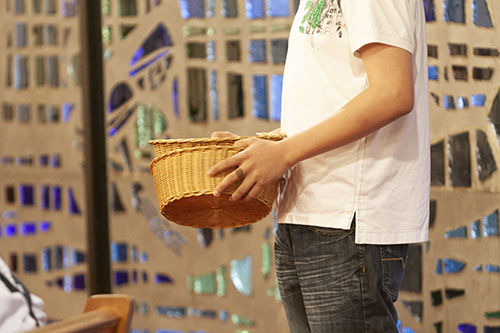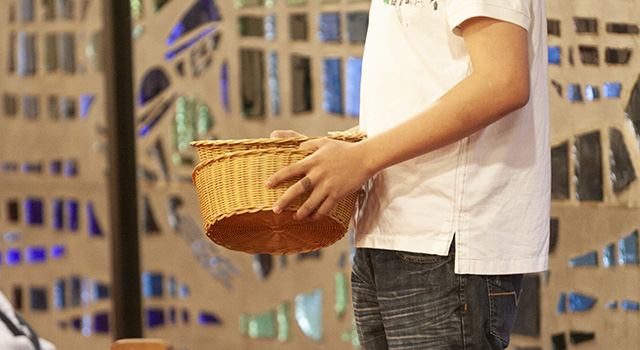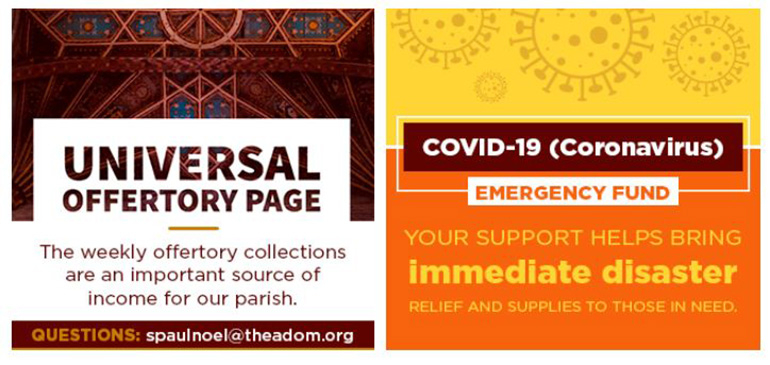By Linda Reeves - The Florida Catholic Palm Beach
MIAMI | The coronavirus may have emptied our churches, but priests and their staffs are still working, creatively ministering to their virtual congregations while trying to keep their parishes financially afloat.
“The parishes rely on their own resources to keep their doors open,” said Grace Veloz, director of stewardship for the Archdiocese of Miami. “Their main source of income is the offertory, but since there are no Masses, there are no collections. Just like everyone at home, the parishes need to keep up with the same bills such as electricity, water, insurance, repairs.”
While observing social distancing, clergy continue to celebrate daily Masses and holy hours, preside at funerals and bury the dead, visit the sick and dying and check on, reach out and comfort their flocks.
Priests are nourishing parishioners in various and creative ways, using their websites, email, phones, video and social media platforms, including YouTube, Facebook, Twitter and Instagram.
Dolores McDiarmid, a parishioner at St. John the Baptist in Fort Lauderdale, was surprised to learn that her longtime pastor, Msgr. Vincent T. Kelly, was now on YouTube.
“My brother told me,” she said. “I watched it. I have to say that it was good to see father and hear his voice. I also noticed today that he continues to write his wonderful weekly messages that I have always found inspirational. He writes beautifully and thoughtfully.”
The archdiocesan Development Office — and parishes themselves — are encouraging the faithful to continue their weekly offertory support through the mail or by making online donations using the parishes’ websites.
“Online giving is not a new concept and is certainly not new to many parishes,” said Katie Blanco Bourdeau, chief development officer and cabinet secretary of Stewardship and Development for the Archdiocese of Miami. “Not all parishes promoted it in the past.”
Presently, 81% of parishes in the archdiocese have online giving features or are in the process of installing systems.
“All parishioners are asked to use this time to transition to online giving,” said Bourdeau. “If parishes do not have online giving available, the Universal Parish Offertory option is available.”

Photographer: ANA RODRIGUEZ-SOTO | FC
Ushers prepare to take up the offertory collection in this file photo. With church pews empty, collections are drastically down in many parishes. Online giving is the best way to continue to support the work of the Church in South Florida.
That’s a tool the archdiocese’s Development Office launched the weekend Masses with a congregation were canceled, March 21. The web-based offertory solution, posted prominently on the archdiocese’s home page, allows parishioners as well as visitors to make donations and pledges electronically from any location at any time.
The Universal Online Offertory is designed to entice donors who have never tried giving online, as well as help those parishes without programs in place.
Veloz believes digital giving is convenient, effective, safe and the way of the future. “It proactively minimizes exposure to infection while helping churches maintain their balance through this crisis,” she said. “More often we are relying less on cash and more on credit and debit cards.”
STAFF STILL WORKING
“We appreciate any support,” said Father Manny Alvarez, pastor of Little Flower Church in Coral Gables. “We are still paying our staff and workers. This is not their fault.”
He said staff, working remotely from home, continue to keep ministries thriving, facilities maintained, bills paid and the parish’s 3,000 families informed and spiritually cared for. Teachers continue to teach online, and construction and maintenance projects are being completed while grounds are vacant.
Father Alvarez continues celebrating Masses and livestreaming them on the parish website and Facebook. He posts daily readings and messages to spiritually inspire, teach and educate. He also keeps well informed about his large flock in order to attend to their needs.
“It kills me that we can’t feed my people with the Eucharist,” said Father Alvarez. “We are feeding them with the Word.”
He explained that while parishioners are continuing to drop offertory envelopes into the mail and in the office mail slot, more and more of them are giving online.
Father Robert Tywoniak, pastor of Blessed Sacrament in Fort Lauderdale, features online giving prominently on his parish website. He continues to provide his congregation with reflections, scripture readings and teachings, all posted on his website and the parish’s YouTube page. The parish’s St. Vincent de Paul Society also recently distributed food to more than 150 families.
Father Tywoniak also is staying in touch with parishioners by email and phone. “It is a personal touch,” he said. “I ask them what they need and how they are doing. I tell them to call me if they need me. It’s those little things we can do that go a long way.”
ARCHBISHOP’S LETTER
Archbishop Thomas Wenski also issued a message March 23 about the importance of Catholics faithfully contributing to support their parishes.
“It is critically important that our parishes receive the offertory support they need to remain operational and sustainable despite the suspension of weekly Masses,” he wrote. “I understand that many of you may not be able to contribute given the economic impact this pandemic is having on your personal finances; however, I hope that those who are able to continue to support their parishes will do so. Your online support will make a critical difference to the operations of your parishes during this crisis.”
UNIVERSAL ONLINE OFFERTORY
- The Universal Online Offertory tool, developed by the archdiocese’s Development Office, is simple to use and can be found on the homepage, www.miamiarch.org.
- Donors are asked what parishes they wish to support and how much they want to give. The online contributor is required to supply payment information, and then, by clicking “secure the payment,” the donation is made.
- All donations are processed through the archdiocese’s Development Office. Credit card and other information is kept confidential, with the highest level of security technology.
- At the end of the month, parishes receive the donations along with a report including the names of donors.
- The Universal Online Offertory is a way for parishioners and other faithful outside the parish to help carry out the Church’s mission in South Florida and support the local parishes.
- For information, contact [email protected].



Comments from readers